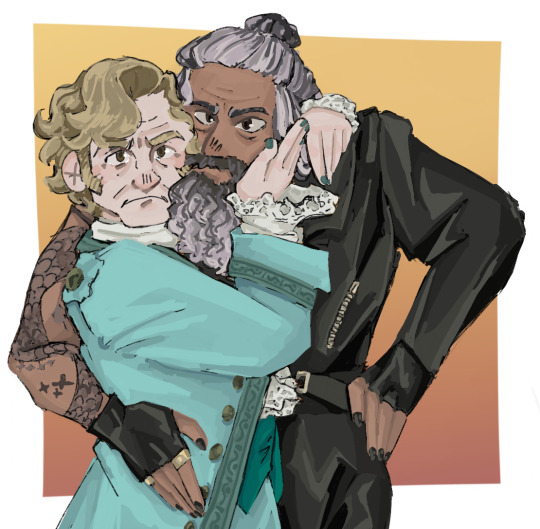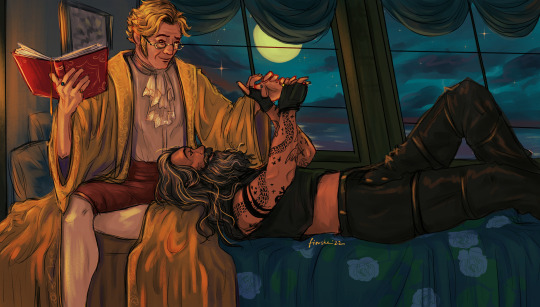roses, thornes and pretty disgusting *** Russian, Whovian, naive
Don't wanna be here? Send us removal request.
Text
WHAAAAAAAAAAAAT?!
Some moron: They need to stop giving Fizz songs. He can't sing.
Me:

583 notes
·
View notes
Text
an outtake of Ed and Stede running toward each other, posted by OFMD writer Simone Nathan
10K notes
·
View notes
Text
I read every academic rivals-to friends-to lovers book I could find
After certain shows made me realise how much I like this trope (*cough cough* Never have I ever and Anne with an E), I went on a quest to find a book that could fill the hole this ships left.
It is a quite specific trope, so finding books that fit this exact description wasn't easy, which left me with only four options, I read them all, and now i'm ranking them beacause I'm bored:
4. Today Tonight Tomorrow (I didn't quite like this one, which is ironic because it is the most popular and highly rated of the four books. The main problem I had with it was the fact that the conversations between the main characters seemed forced to me and it falls into the "I actually never disliked you, I've been secretly pining for years" thing that a lot of enemies to lovers stories have. When I say I like enemies to lovers, I mean ACTUAL enemies to lovers, I like the secret pining when their relationship is starting to develope, not when they are in the "rivals" phase, because that kind of takes away the whole meaning of RIVALS, I get that some people like it that way, but it's not what I was looking for).
3. Kissing Erza Holtz and other things I did for science (This one is a bit different because the main girl is not obsessed with getting good grades, but they are rivals and they are in an academic setting so it fits the trope. It was a short and light read with great representation and relatable characters, so I overall enjoyed it, unfortunately, it also does the "I've always loved you" shit, so that ruins the rivalry for me).
2. What's not to love (I guess I could say this is the one that fits what I was looking for the best: the main character's dynamic was basically benvi, you can actually see a rivaly between two study nerds develope into someting else, good chemistry and, again, they actually start of hating each other).
1. The only thing worse than me is you (This is a modern retelling of Shakespeare's Much Ado About Nothing and I loved every second of it. The writing style is fluid and the dialogues are funny, with a lot of pop culture references used in a way that instead of bothering me reminded me of Loralai Gilmore. This book fits the trope perfecly while being fun to read and managing to really stand out to me among other three books that have basically the same plot, chef's kiss)
203 notes
·
View notes
Text
stede, inadequacy, and the perpetuating cycle of self-hate and low self-esteem
i've been pondering making a post on this ever since i started my live re-watch (which. no one ask how that's going) because that "i am adequate" moment of stede's is just. exquisite.
the surface layer of this moment is that it shows that stede's self-esteem is clearly in the toilet, because his pep-up talk to himself, his power-pose serious-face getting-himself-together moment, is saying something as underwhelming as "i am adequate". it's heart-warming that he's realized this about himself, and heart-breaking that this is as far as his self-confidence can take him.
but as i've considered the series, and stede, on further rewatches, what i've started to notice is... that statement is correct. mostly.
stede is adequate. stede is fit for the task at hand. stede is, in this moment, capable.
and the part that i've been chewing over is: this may be one of the very few moments in stede's life where this is true.
think about it: stede has been told all his life that he is a lily-livered little rich boy, that he's a coward, that he's useless, that he has nothing of worth and value to the world. now, obviously these are horrible, cruel, and objectively terrible things to say to any child, and it's hellacious that these things were repeated to stede by his father and peers, and that his mother appears to have played absolutely no roll in counteracting that message, and people come out of that kind of confidence-destroying, self-esteem crushing experience with, generally, one of two responses:
they make themselves the best thing since sliced bread often accompanied by a brutal perfectionism streak
they stop making real efforts and withdraw because nothing they do will ever be good enough
stede's pretty clearly fallen into that second category. by the beginning of the series we can see that pre-the revenge stede (and honestly, even captain of the revenge!stede) has retreated primarily into a life of fantasy and fiction, withdrawing into reading and his own thoughts and barely paying attention to or really interacting with the world around him.
he reads at the dining room table, able to completely block out the sounds of his children running and shouting, fails to hear mary even when they're having direct conversations (buddy she hates the ocean-), has hired lucius to record fantastical versions of his life as a pirate for what appears to be the specific purpose of turning them into a memoir...
stede has checked out completely. and the thing is? you cannot be "useful" or "helpful" or "build meaningful relationships" when you are that checked out.
at that point in his life, post-childhood and pre-piracy, stede had checked out of being an active participant in his own life. he marries the woman his father found for him, he and mary have the children that are required (i don't think it's a coincidence that the writing team chose to give them only two children, and make the youngest the boy), and they live the very bare-bones version of the life they're supposed to and it is not enough. they are rich and comfortable and have family dinner nightly and stede is so miserable that he cries alone in the dark.
and part of that is because he hates his life. part of that is because this life doesn't fit him and it's not what he wants. part of it is that he's about as straight as an ouroboros.
but a big part of it is that stede still feels as useless and unwanted and incapable as he was made to feel as a child, only this time, the reason he feels that way is because he's internalized how horrible he is at everything, so he doesn't even really try.
sure, we don't see a lot of stede and mary's married life, but what we do see speaks volumes: mary seems to be the principle minder of the children, the one who knows about their nightmares, the one who asks them about their favorite animals, the one who enjoys raising them. mary also seems to be the active partner in the marriage: mary makes an anniversary gift that represents their marriage and wedding day, crafted from her very own creative pursuit that she wants to share with stede.
the primary interaction we see stede have is playing pirates with the children right after mary has asked him not to because it's caused nightmares, and using the moment where mary has asked alma and louis about their favorite horse to interject with his favorite horse.
and like, i'm not here to say stede was a horrible useless father or anything like that, but as a father, stede was clearly not successful - louis is absolutely old enough to remember his father, but he doesn't, even though it can't have been more than a few months since stede left, a year at the absolute maximum. and that could be interpreted as louis being passive aggressive, but i think that would be a very loose interpretation; it's much more likely that stede was genuinely not a strong presence in louis' mind, because he wasn't a very involved parent.
the primary interactions we see between mary and stede are equally distant - stede barely touches her for their engagement/wedding portrait, is also distant in the family portrait (which is one reason he can be so easily painted out of it), appears to regularly ignore mary during conversations or at the very least quickly forget about them (the ocean.... bro the ocean -), and provided an anniversary gift that was entirely focused on his own wants and needs, aka, the desire to retreat further into those fantasies by running off on a boat. to break up the monotony - which he's clearly never spoken to mary about feeling, because she's shocked to hear that he finds their lives monotonous.
and like, domestic life can be very monotonous - but it can also be dynamic and exhilarating, especially when you have young children and you're helping them grow and change and transform into actual people. it seems very likely that one of the reasons that stede finds life with his family so monotonous is that he's not actually participating in it.
and this is probably part of why he cries at night. this is definitely part of why he feels useless, and its absolutely why he thought he could just walk away from his family without a real word to them about it. to tie this back to the thesis statement:
stede has been "inadequate" his entire life, and that was initially due to the abusive and unrealistic standards he was held to by his father and peers, but that continued into his adult life because of stede's own internalizing of that abuse. stede is inadequate because he doesn't try, not in ways that would leave him emotionally vulnerable, and he doesn't try because he's been told all his life that he's useless and inadequate and a failure. it's a perpetuating cycle that doesn't break until stede finally walks away.
the idea came to stede to escape further into fantasy and build that boat - and he had it built, without speaking about it to mary until it was far enough along that it was either completed or nearly so, depending on how much time you think passed between the anniversary scene and the "we only have one life" scene. the idea was initially one where he was accompanied by his family, but it doesn't seem like stede actually considered the details of actually having his family aboard the ship, not the way he considered the details of having it entirely crafted to his preferences and desires and interests. his family being aboard the ship with him was not the central focus of the fantasy - the fantasy was running away and starting a new life as someone cool, someone adventurous, someone people respected.
stede was inadequate as a father and husband, because he was too convinced of his own worthlessness to *try* to be a good father and husband. he was no longer being psychologically and emotionally abused at home, but it didn't matter, because his mindset was such that his own unpacked trauma was doing a fine job of carrying out the abuse in absence of people eager to inflict the abuse for him.
and then we get to the revenge, and stede is, as we all know, entirely inadequate as a sailor, a captain, and a pirate.
he has great ideas, he has a people positive management style, and plenty of money to throw around, but he doesn't know how the ship works, he doesn't know how to help on the ship, and he doesn't know how to engage with his crew in a way that earns their respect. they don't hate him, but even lucius is on board for the mutiny, and even oluwande, who actually seems to like him first, thinks he's going to get them all killed. everyone except stede knows he's bad at this, and then, stede knows he's bad at this.
and it's pretty crushing! it hurts his confidence, a LOT, and then in walks nigel badminton, a living representation of that internalized self-hatred and all stede's low self-esteem... of course stede whacks him over the head once nigel starts in on the bullying and the rhetoric. of course he does! there's only so much a person can take.
this is when things start to turn around a bit for stede. first: the guilt and the horror set in, the emergence from fantasy back into something like reality: stede realizes that there is no going back. there is no return to his old life. he is a pirate and being a pirate is not like the fantasies he had - it is killing and blood and his childhood bully's corpse on the ground in a puddle of blood, a sword through his head. it is taking hostages and realizing his crew wants to torture them and trying to gently ease away from that. it's losing his hostages and again realizing - i might be bad at this. i might be terrible at this. i might once more be as useless as everyone has always said i am. it is freaking out, and then it's gathering himself once more and saying -
"i am adequate"
it's trying. it's actually trying, earnestly. that plan to steal the hostages back from izzy might be silly and ridiculous, but it's thought out, and most importantly, it takes advantage of stede's only strength - everyone underestimates him. everyone thinks he's useless.
he wins his men back because izzy turns away from him even though stede has a knife drawn, because he never thinks enough of stede to imagine he'd do something with it.
in these first two episodes alone, we see stede put forth more significant effort at being a pirate than he ever seems to have put being into a father or husband. he's engaging. he's sharing his interests in a way that invite others to develop their interests. he's sharing vulnerability and seeking counsel and guidance. he's putting himself out there, and the show rewards him for this with success: with getting his first hostages, and then with stealing one back from a trio of actually dangerous pirates. episode three actually continues this trend, despite the fact that stede is tricked, betrayed, and stabbed - episode three shows us that by trying, by putting forth efforts, by not withdrawing but being active, stede has captured the attention of blackbeard himself - leading to stede's rescue in his great time of need, by blackbeard himself.
and episodes four through seven feature stede rising to still greater heights - the more effort he puts in, the more he's rewarded. it's a pretty simple point but it's there: the less stede withdraws from the world, the more effort he puts in, the more effort he puts in, the more adequate and confident he feels, the more adequate and confident he feels, the more he bonds with other people -
to the point that in episode eight, stede has enough confidence to stand in front of his crew and ed both and tell jack to get off his ship. even after an entire episode where he was pushed back into those feelings of inadequacy and helplessness, he takes his newfound confidence and sense of self and he sets a hard boundary and tells jack to get off his ship, and just as importantly, he does not take it back even when this causes him to lose ed.
yes, he spends the entire night spying on them like a creep, but stede does not go chasing after ed, he doesn't lower the boundary, he doesn't trample over his own newly-gained sense of self-worth by frantically backpedaling. even in the face of a break up, he holds fast.
that's really fucking good. that's incredible, for a guy with such terrible self-esteem, and i would wager that most of you reading this felt as proud of him as i did.
which is also, by the way, probably the same reason most of us felt so damned disappointed in episode nine, when stede falters under chauncey badminton and the re-traumatization of seeing him die, and the horrible, soul-destroying spew of words spat at him.
stede goes back to his family in barbados not because he actually wants to be with them, but because he wants to punish himself. because he feels that he is a plague upon the earth who has ruined ed, and that by leaving he somehow unbalanced the universe and caused destruction to his family. he is resigning himself to a life he hates (and resigning his family to living with him and his misery) because the trauma of that experience - from the kidnapping all the way down to chauncey's accidental death - has eviscerated his burgeoning self-confidence and newly grown sense of self-esteem. in that moment, stede is lower than any other moment in the present course of the show, because by the time the show started, stede had decided he deserved happiness, no matter how inadequate he might be. end of episode nine stede has relinquished that.
he is making his house a prison again, a place of misery and pain, again. because stede's house could have always been a better place. his relationship with mary would have never been romantically loving, but it could have been friendly, it could have been warm. his relationship with his children could have been close-knit and essential, instead of a bond so thin Louis has already forgotten him. all stede would have needed to do is meet them halfway, and he couldn't. he was too miserable, too-filled with self-loathing, too consumed by other people's judgements of his worth, and now he's pickling in that toxic cocktail of self-hate and self-doubt all over again - and where stede was expressing it all via withdrawal and sadness before, now he expresses it through anger.
he's angry that he came back and no one seems to have missed him. he's angry that mary replaced him. he's angry that mary won't give up the "dishonest title", won't give up the life she made for herself the way he gave up the life he made for himself. he's hurting still and he's sad still, but he's expressing it through anger, and that's why he's snide and cutting and passive-aggressive, and eventually, violent. stede's angry that he gave up everything to come back here and fix what he "ruined" and the sacrifice isn't appreciated or wanted.
and then you know, he's nearly killed and the shock of that bursts his bubble, and the tension between he and mary. they talk, finally. mary gets what she wanted, which is a conversation, which is stede meeting her halfway, and between the two of them and in a newly safe space, stede can admit that this isn't working, and he can admit what will work, and he can admit what he wants, which is to be in love with ed and go after him.
but he was only able to get to that point because he started trying. he was only able to reach out and find closure and peace and love and happiness and friendship because he stopped checking out, stopping punishing himself, and started trying.
the only way out is through. wherever you go, there you are. the only way for stede to begin overcoming his trauma and grappling with his low self-esteem and endless cycle of misery was to invest in his life and engage with it and do something, anything, about it.
that's one of the many points of stede's narrative: that you have to try. you have to reach out. stede was a participant in making his own misery, and mary's misery, and his kids' misery, all because after years of emotional and psychological abuse he had withdrawn into himself and stopped reaching out - which meant that he couldn't have meaningful connections - which hurt - which made him withdraw, and so on, and so on.
the point of stede being a middle-aged man when he finds love and gets his first tastes of real happiness is to show that it's never too late to start over. it's never too late to try. it's never too late to be an active participant in your own life. it's never too late to choose happiness.
tldr: you can't feel adequate or confident or happy if you don't become an active participant in your own life.
483 notes
·
View notes
Photo

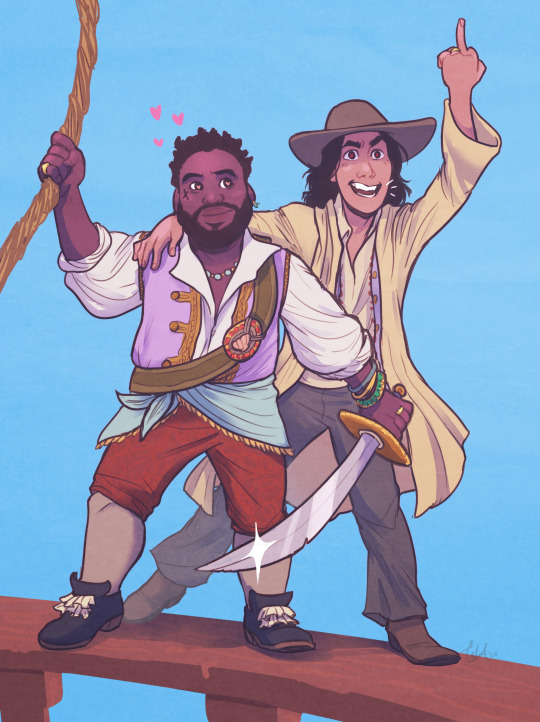
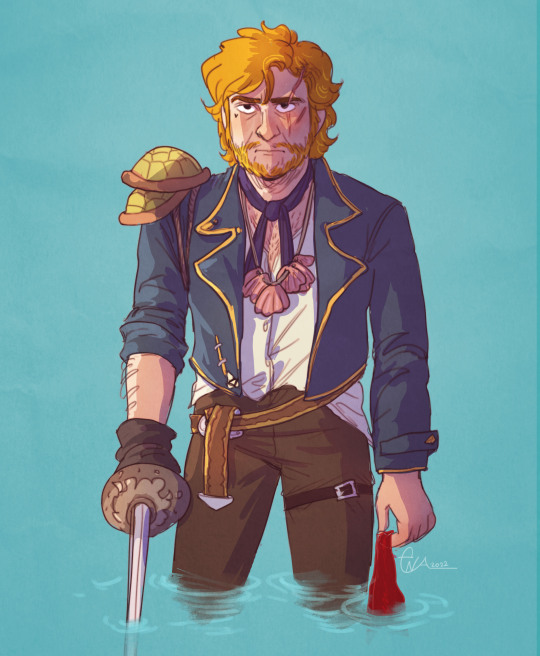
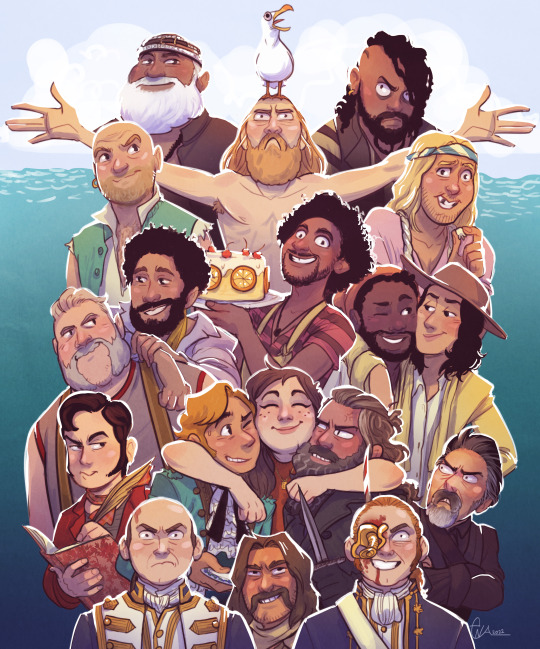
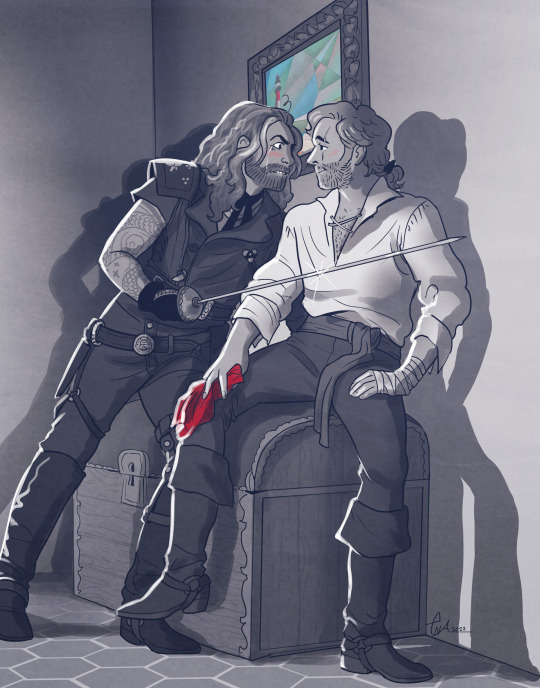


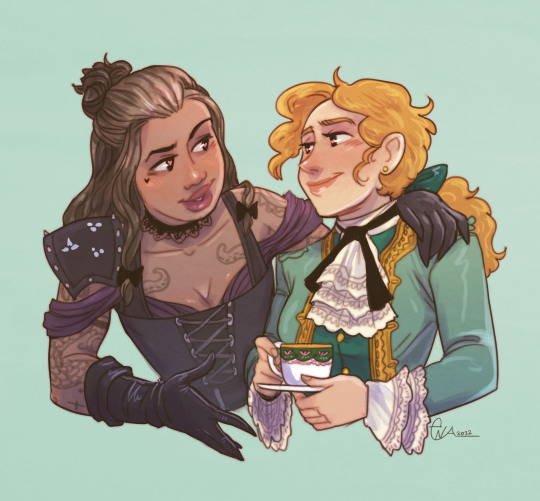
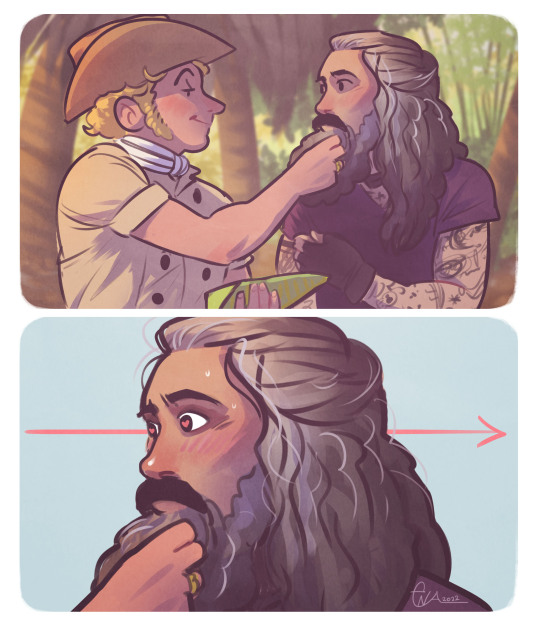
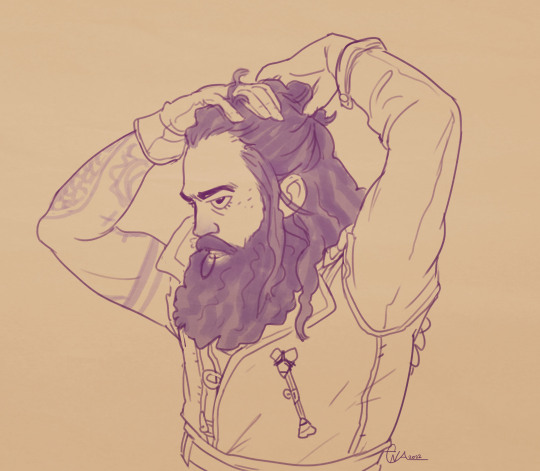
Geeez I haven’t been on Tumblr in literal years. Hi everyone I hear there’s a solid OFMD community here and I’ve been obsessively drawing fanart of our favorite pirates for months now! Here are my favorites, hope you guys like em <3
4K notes
·
View notes
Text
ngl every day i get more bewildered and mildly concerned (in a yikes yikes yikes way) when i see that people genuinely think izzy is a good friend, or acting from a place of *healthy* concern. like. bro.
if you have a friend who acts like izzy you need to RUN. its not that izzy is just a good friend or trying to get people to focus and do their jobs - he's an abusive manager and a toxic af friend, and failing to acknowledge that is just... which isn't to say no one can like him. but to like him and deny those things is just like. bro. how can you not see how bad he is to the people around him???
is this what it was like to see the snape wives in action?
173 notes
·
View notes
Text
Sad scenes, nevertheless, are hilarious in this show. That's why I love it
i never wanna see them this sad without eachother ever again


104 notes
·
View notes
Text
Yeah, here I am

Good morning Ofmd/Wwdits fandom I am officially spiraling i think
1K notes
·
View notes
Photo










Geeez I haven’t been on Tumblr in literal years. Hi everyone I hear there’s a solid OFMD community here and I’ve been obsessively drawing fanart of our favorite pirates for months now! Here are my favorites, hope you guys like em <3
4K notes
·
View notes
Text
Well, I suck at making content, or reblogging AND tagging every post I like, but hear me out, dear OFMD family!
You're amazing. Thank you for being there for the show, and the crew, and all the crazy mappets (and Izzy). Your brilliant arts, gifsets, fanfiction meta and LOTS OF LOVE are so precious (and like keep me sane these days).
Thank you. I love you.
11 notes
·
View notes
Text
🏴☠️OFMD META🏳️🌈
wanted to share some of my favorite ofmd analysis on this site, shout out @bookshelfdreams for the inspo and i suggest you check that post as well.
- OFMD and masculinity by @waititisbf
- Queerness and romcoms by @sixth-light
- The symbolism of the closet by @edandstede
- Roach's tattoos by anissapierce
- Stede, the unwitting seducer by @layofleithianshitposting
- OFMD and violence by bookshelfdreams
- OFMD and homophobia by @glamaphonic and @amuseoffyre
- When does Ed lose his temper? by amuseoffyre
- Wedding imagery in episode 9 by @louisianna
- Generational Trauma in OFMD by amuseoffyre
- How OFMD destigmatises homosexual intimacy by @admiral-derbyblossom and @blackbonnetblog
- A Biracial Reading of Blackbeard by @lunaescribe
- OFMD and body diversity by amuseoffyre and @orionsangel86
- OFMD and postmodernism by @wistfulrat
- Stede as the effeminate gay by @mirkwoodest
- What does Black Sails and OFMD say about love? by @michshlo
1K notes
·
View notes







